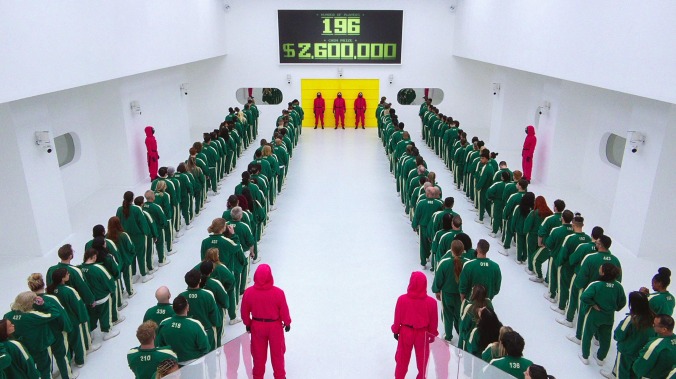Squid Game: The Challenge should not be a thing
Netflix's competition takes all the wrong lessons from the South Korean hit that inspired it

If you’re brave enough to press play on Netflix’s Squid Game: The Challenge, prepare to be disappointed and, even worse, bored. The reality series is an utterly dragged-out, inauthentic mess that takes all the wrong lessons from the 2021 South Korean hit that inspired it. The takeaway from Squid Game should not be “Hey, let’s make this scary shit real” or “What if we got people to sign up for a non-fatal version of a show that depicted the fear of dystopian capitalism and then treat them like garbage for the sake of entertainment?”
Plus, The Challenge isn’t even amusing, which could have at least been its saving grace. It seems to exist to shock and awe, but fails spectacularly at both. If the creators thought having the same shiny, freaky set as Squid Game—which was released two whole years ago—would be exciting enough, they were wrong. The show borrows some competitions from the original series, but some are new and prolonged for poorly manufactured drama. The contestants are reduced to caricatures. What’s more, the show is neither exciting nor inventive—and it has nothing to add to Squid Game’s overarching message. Here, the stakes are slim. So it raises simple questions: What is the point? Why does something so lacking in morals, common sense, and even fun exist?
You’re probably asking, “Don’t a lot of reality TV shows fall under that generic umbrella?” But Squid Game: The Challenge is particularly fucked up. Unlike other heightened competition reality shows, this one stems from Squid Game, which examines how the common man is forced to fight to the death—literally—to survive. It’s not just about the bloody, cruel games the players are forced to battle in, but who orchestrates them for personal enjoyment. Squid Game is a sharp anti-capitalist TV show. The Challenge is just a trashy and often sad rip-off.
Four hundred and fifty six people sign up to voluntarily stay in the Squid Game set, sleeping on bunk beds in a claustrophobic dormitory and trying to pass all kinds of physical tests and mind games. (Juicing enough oranges in 30 minutes so everyone can get a “treat” is one of them.) Through talking heads, some contestants reveal reasons for partaking in this. Understandably, they want the hefty $4.56 million cash prize, no matter how painful, emotionally draining, or embarrassing the cost.
Despite some relatable backstories, Squid Game: The Challenge never connects. It’s hard to care when contestants “die,” as black dye bursts onto their clothes and they drop on the floor in tacky fashion. Or when they rabidly lick dalgona cookies in a bid to then crack them with a needle. Or when only one of them receives a burger and fries, but the rest frantically descend on the tray for a fry or two. Or when a French man suddenly becomes a villain because he’s “a little rude.” Or when a couple of women “clean” carefully littered toilets.
Squid Game: The Challenge’s singular bonus point is that it’s not shy about eliminating the valuable players who get more focus. (It’s their version of decapitating Ned Stark when you least expect it.) But if you think about it, there’s no choice when a whopping 456 people are involved and several of them need the limelight to make this effective. So, technically speaking, even the one good thing is a default, not a strategic storytelling choice. Beyond copying Squid Game, no strategy seems to have been involved anyway. What was involved was loads of money in recreating sets, figuring out cookie recipes (apparently, it took months upon months), and coming up with that record-breaking winning sum.
In an interview with The Telegraph, executive producer Tim Harcourt dismissed criticism of the show by saying, “Well, I’ve got two teenage boys and [those critiques] wouldn’t even enter their mind as to what that show is about. They see it as being a fantasy game world.” Squid Game: The Challenge is anything but a fantasy. It’s reality TV at its brutal worst.